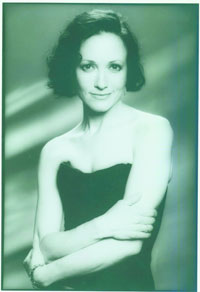Bebe Neuwirth won’t let her crooning take back seat to her acting
I was young, I was just 16 then,
When you came up from Burma one day
And you told me to pack up my suitcase
And I did, and you took me away . . .
You said a lot, Johnny. It was all lies
You sure had me fooled from the start
I hate you when you laugh at me like that.
Take that pipe out of your mouth, Johnny.
Surabaya Johnny. Is it really the end?
Surabaya Johnny. Will the hurt ever mend?
Surabaya Johnny. Ooh, I burn at your touch.
You got no heart, Johnny, but oh, I love you so much.
––from “Happy End,” words by Bertolt Brecht, music by Kurt Weill
Kurt Weill said that every note he ever wrote he heard in the voice of Lotte Lenya.
Neuwirth will be singing “Surabaya Johnny” and a half dozen other seething, sexual, cigarette-stained, lemon-tinged, imperishable songs-––some in English, some in French––as soloist in the Collegiate Chorale’s “An Evening of Kurt Weill” at Lincoln Center’s Alice Tully Hall on February 4.
The actor Roger Rees narrates, directs, and will sing some Weill numbers himself. Conducting the company is the chorale’s music director, Robert Bass.
A press announcement had billed Bebe Neuwirth as “making her cabaret debut this evening,” but over the telephone the other day the two-time Tony Award-winner (for “Sweet Charity” and “Chicago.”) said, “That’s actually incorrect,” adding, sweetly matter-of-factly: “I made my cabaret debut 22 years ago. At Martin Charnin’s Upstairs at O’Neal’s on 43rd Street.”
Neuwirth, who was born in Princeton, New Jersey, on a New Year’s Eve when “Threepenny Opera” was still playing at the Theater de Lys on Christopher Street, and who first hit the spotlight in “A Chorus Line” in 1975, says she had “not really” been exposed to much of Kurt Weill until 1991 or ‘92.
“That was when I was in a production in Los Angeles of ‘degenerate’ cabaret material,” she explained. “There was a big exhibit at the same time there in L.A. of ‘degenerate art’––work mostly of the Weimar period. Many of the artists had committed suicide or gone into the camps or gone into exile.”
Of course, Neuwirth was referring to the art that the Nazis damned as degenerate, with Brecht, Weill, and Lenya fleeing into exile.
Weill, of course, was a three-strikes winner: a homosexual, a Jew, and a Communist.
“Actually, Robert Rees was in that show with me, and in it I did also sing ‘Surabaya Johnny,’” Neuwirth said.
At Alice Tully she’ll be singing that incredibly haunting number as well as the ‘Sailor’s Tango,’ both from the 1929 Brecht-Weill “Happy End,” a cynical morality saga of good (Salvation Army) and bad (Al Capone types) set in a fictional 1920s never-neverland Chicago.
From 1934’s “Marie Galante” (Jacques Deval and Weill), a melodrama about the short unhappy life and death of a goodhearted prostitute in the Canal Zone, Neuwirth will do four songs, all in French: “Le Roi d’Aquitaine,” ‘J’attends en navire,” “Les filles de Bordeaux,” and “Le train du ciel.”
And, from 1949’s “Lost in the Stars” (Maxwell Anderson and Weill), the title song.
Neuwirth was far too young to see and hear Lenya in “Three Penny” on Christopher Street, but she has of course listened to Lenya on CD, and was herself a Pirate Jenny at the American Conservatory Theatre in San Francisco five years ago.
Far more recently, she, Roger Rees, Ann Reinking, and music director Leslie Stifleman worked on a Kurt Weill show of their own for Off or Off Off Broadway. Last October there was what is called a “presentation” of it at a rehearsal studio in the city.
Executives of the Kurt Weill Foundation also attended. Neuwirth reports that “Roger invited Robert Bass to see it,” which is how Neuwirth and Rees find themselves on the bill at Alice Tully this coming Wednesday.
All she’ll say about the project is that “it’s set in a harbor bar, and there’s a bartender, and two rough guys, and a woman, and everybody sings, and we dance a little”––anybody who saw “Chicago” knows how Bebe Neuwirth can dance.
What’s the working title of your show-in-progress?
“That should probably be for another interview.”
Does the woman in it have a name?
“If she does, that would be known only to me. For an actor, there are things about a character that nobody else knows, or should.”
Surabaya Bebe: We burn at your touch.
You got no heart, Bebe, but oh, we love you so much.


































